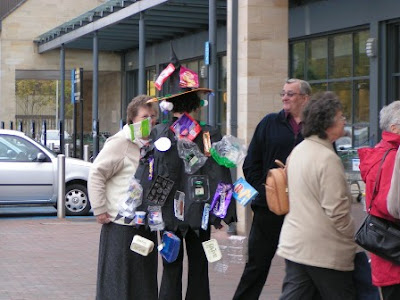Posted with permission - credit to the
Centre for Alternative Technology carbon gym team.
Humans are probably a significant driver of global climate change, by emission of 'infrared active' gases: CO2, CH4, NOx etc. We can estimate the contribution of our various activities - roughly, half are 'individual' e.g. car exhaust, and half, 'joint' e.g. burning fossil fuels to heat public buildings.
CAT is about to re-launch their
Carbon Gym calculator. They think in terms of four types of emissions: (1) Direct and measurable; (2) Indirect, pro-rated on the bases of purchases; (3) Indirect, not pro-rated and attributed to the industrial sectors; (4) Fixed infrastructure, not pro-rated and attributable to government policy. They quote the following:
UK national average: 11 tonnes CO2 equivalent per person per year.
Breakdown: Direct - 35%; Indirect - 50%; Infrastructure - 15%.
Global per capita sustainable target: 2.5 tonnes CO2e per year
"The data comes from a variety of different sources including the Department for Trade and Industry, Department for Agriculture Food and Rural Affairs (DEFRA), the Intergovernmental Panel on Climate Change and the Office of National Statistics."
On the basis of this research, CAT advise on ways to reduce CO2e. (They do not include work-related activities e.g. business trips). In rough order of priority:
(1) Fly less - you, and your goods.
Rough CO2e (tonne per person per trip) from the UK: 0.25 UK, 0.6 Europe, 2.0 USA, 3.0 India, 5.0 Australia.
(2) Drive less - you, and your goods.
Rough CO2e (tonne per vehicle per year): 1 per 5000 miles.
(3) Watch what you eat - prefer local, organic, unprocessed plant foods.
Rough CO2e (tonne per person per year) eating ordinary supermarket ready meals: 8
eating vegetarian supermarket ready meals: 2.5
cooking omnivorous supermarket food from scratch: 3
cooking omnivorous local organic: 0.5
cooking local vegan-organic: 0.1
(4) Don't heat with electricity - use solar, wood or gas.
Rough CO2e (tonne per person per year): Kept 'nice and warm' with electric heat: 5
with mains gas: 2
(assumes two occupants, moderate size detached house not to current building regulations)
Kept 'comfortable', mains gas, wall insulation, thermal glazing: 1
(5) Buy less - your indirect emissions are strongly correlated with 'disposed income'.
(6) Get political - to reduce 'infrastructure' and 'industry' emissions.





 The speaker this month was Shaun from Going Carbon Neutral Riverside. GCNR us a grass roots organisation based in teh riverside are of Stirling (right) who are working toward reducing emissions in their community.
The speaker this month was Shaun from Going Carbon Neutral Riverside. GCNR us a grass roots organisation based in teh riverside are of Stirling (right) who are working toward reducing emissions in their community. FED UP WITH THE EXCESS PACKAGING YOU ARE TAKING HOME?
FED UP WITH THE EXCESS PACKAGING YOU ARE TAKING HOME?